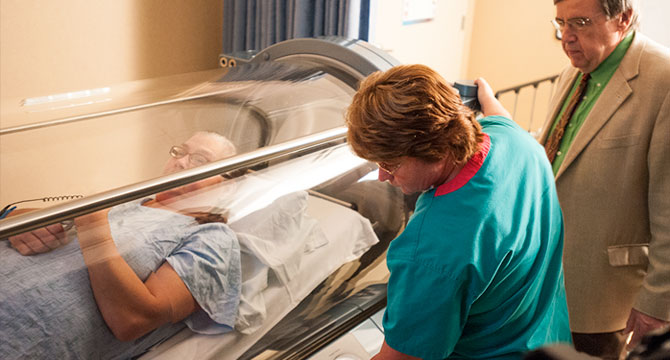
For most people the body naturally heals when it has a wound. But for those who have difficulty healing, specialized treatment may be required.
Non-healing wounds can occur for many reasons, including diabetes or other chronic disease, poor circulation, nutritional status, or age and body size. The Marshall Wound Healing Center offers comprehensive wound healing for the treatment of complex sores and wounds that will not heal. Our wound healing team is comprised of physicians and certified clinical staff committed to healing complicated wounds using state-of-the-art treatment options and advanced technologies, including hyperbaric oxygen therapy (HBO).
The Marshall Wound Healing Center is conveniently located at Marshall Professional Center, with front door drop-off and parking directly in front of the building. For an appointment please call 256.894.6976.
What is a non-healing wound?
A non-healing or chronic wound is defined as a wound that does not improve after four weeks or does not heal in eight weeks.
Individuals with diabetes are at especially high risk for chronic wounds, especially on the feet. Circulation issues and a decreased sense of feeling, known as neuropathy, can mask the presence of sores and ulcers. If you have diabetes, any sore or tender spot on the foot warrants immediate attention from a physician, regardless of how long the wound has been present. Left untreated, these wounds can lead to serious problems, including chronic infections, gangrene and amputations of toes or a limb.
What is hyperbaric oxygen therapy?
It is vitally important for a physician to assess any foot wound on a person with diabetes as soon as possible. The staff at Marshall Wound Healing Center is highly experienced in treating and healing chronic wounds for people with diabetes. Our hyperbaric oxygen therapy program (HBO) is one of several effective healing options.
- Hyperbaric oxygen (HBO) therapy is a highly effective, safe treatment during which 100 percent oxygen is inhaled by a patient for short periods of time in a pressurized chamber.
- HBO is helpful in treating any condition requiring increased oxygen flow to body tissue, including non-healing wounds for patients with diabetes or other conditions, chronic radiation injury, compromised grafts and flaps as well as 12 other specific conditions. For these conditions, HBO is a Medicare reimbursed treatment option.
How do you recognize whether a wound is infected?
Symptoms of an infected wound
A qualified physician who deals with non-healing wounds is your best resource for questions about potential infection from a wound that is not healing properly. Symptoms that may indicate an infection include:
- Increasing pain
- Redness and warmth around the wound
- "Oozing" from the wound
- An odor coming from the wound
Infection is the greatest risk from non-healing wounds. Each of us is exposed every day to common bacteria such as staphylococcus and pseudomonas. These bacteria are present on our skin and in the environment around us. They don't present a problem when we are healthy and wound free but an open wound increases the risk for infection, which can lead to serious conditions, including the loss of a limb.
Common places for non-healing wounds
- Feet, ankles, heels and calves
- For people unable to walk, common places include hips, thighs and buttocks
We Offer Treatments For Many Types Of Wounds
- Brown Recluse Spider Bites
- Chronic Osteomyelitis
- Crush Injuries
- Diabetic Wounds
- First & Second Degree Burns
- Gangrene
- General Problem Wounds
- Non-Healing Incisions
- Pressure Ulcers
- Radionecrosis / Osteoradionecrosis
- Trauma Wounds
- Wounds Due to Poor Circulation
Diagnosis and Treatment
Our physicians and staff use one or more of the following diagnostic treatment options to tailor a program just for you:
- Laboratory evaluation
- Vascular studies
- Nuclear medicine
- Radiology exams
- Skin or tissue grafting
- Medications and dressings to enhance wound healing
- Physical therapy
- Hyperbaric oxygen therapy (HBO)
- Dialysis
- Nutritional management
- Transcutaneous oximetry
- Diabetes education
Frequently Asked Questions
Do I need a referral?
No. You may refer yourself.
Do I need an appointment?
Yes. An appointment is required to see a physician.
What happens at my first visit?
On the first visit the physician will do a wound evaluation and develop a treatment plan for you.
How many visits are normal?
Patients are normally seen once per week, and most wounds are healed within 16 weeks. Patient compliance is very important!
Does everyone receive Hyperbaric treatments?
No. All patients are not eligible for hyberbaric oxygen therapy. We have two hyperbaric oxygen chambers, and the guidelines for their use are very strict.
Does the Wound Healing Center become my primary care physician?
No. We take care of the patient’ wounds. The primary care physician and the referring physician are kept informed of the patients' progress and treatment plan by way of our Wound Progress Reports.
Do we accept insurance?
Yes. As an outpatient department of the Marshall Medical Centers, we accept the same types of insurance that are accepted by the hospital.







